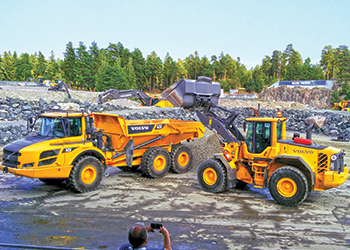
In action ... the prototype autonomous wheel loader, a specially adapted L120E, and the adapted A25F articulated hauler.
Volvo CE offers peek into the future
01 October 2016
SREE BHAT provides an insight into some of game-changing construction equipment prototypes developed by Volvo Construction Equipment.
Autonomous and electrical vehicles are set to bring revolutionary changes to our roads and similar far-reaching innovations are taking place in the heavy construction equipment sector too.
Imagine a driverless wheel loader, a cab-less hauler and a quarry without a worker. This is the shape of things to come in the sector as evidenced at the Volvo Construction Equipment (Volvo CE) Xploration Forum in Eskilstuna, Sweden, last month.
Engineers and researchers at Volvo CE are currently working on innovative solutions that they hope to bring to market. The machines are set to push the boundaries of engineering, automation and electrification and could soon be doing all the hard work with little or no human help.
“It is not just a vision, we call it a plan. The technology we see today is just the beginning,” say Volvo CE executives as they showcased a range of futuristic concepts and innovations from autonomous machines to electromobility and total site solutions.
Hundreds of customers, members of the international press, government representatives and academics were given an exclusive look at a host of ground-breaking technologies that have the potential to transform the industry by Volvo CE executives at the forum.
Highlights at the event included the unveiling of the LX1 prototype hybrid wheel loader, a machine with the potential to improve fuel efficiency by up to 50 per cent; demonstrations of a prototype autonomous wheel loader and articulated hauler working together; and an electric site solution that showcased the new-concept HX1 autonomous, battery-electric, load carrier (see separate box).
Volvo CE is developing new technologies that will make operation of construction equipment and heavy trucks easier, safer and autorun, say officials.
They insist that customer collaboration is essential in achieving the disruptive change the company is seeking to make and bringing these innovative technologies to market.
All of the innovations shown at the Xploration Forum are ongoing research projects that aren’t commercially available at this stage and it was not revealed when they will go into production.
 |
|
Weissburg ... intelligent technologies. |
Innovating for a sustainable future
“In line with the Volvo Group’s vision to be the most desired and successful transport solution provider in the world, Volvo CE is committed to contributing to sustainable development,” says Martin Weissburg, member of the Volvo Group Executive Board and president of Volvo CE.
“At Volvo CE, we are developing technologies connected to electromobility, intelligent machines and total site solutions that will benefit our customers and the environment by contributing to increased machine performance, productivity, efficiency, safety and sustainability. Our future products and services will play an important part in building a sustainable society,” he says.
“Volvo CE is at the forefront of technological development,” he continues. “Each year, the Volvo Group invests billions of Swedish Kronor in research and development to drive the evolution of new innovations. We organise events such as the Xploration Forum because we want to share our exciting projects and concepts with the world. Although this technology may be years away from – or may never enter – production, it will undoubtedly influence our future offering and has the potential to transform the construction industry as we know it. The progress our engineers are making is exciting.”
“We’ve set ourselves four key technology challenges that we call Triple Zero and 10x: zero emissions, zero accidents, zero unplanned stops and 10x higher efficiency,” explains Weissburg. “We believe that our clear focus on electromobility, intelligent machines and total site solutions will help us achieve these ambitious goals and pave the way for a sustainable construction industry.”
Volvo Concept Lab
The innovations shown at the Xploration Forum were presented under the umbrella of ‘Volvo Concept Lab’, a new Volvo Group initiative. From now on, Volvo-branded companies within the Volvo Group will showcase their research and development projects under this technology communication platform.
The LX1 prototype hybrid wheel loader under development is powered by batteries and a diesel engine and it can be operated in virtual silence. While the diesel engine is very small, the combined peak output of the engine and batteries is much higher than that provided by the diesel engine in a conventional wheel loader of comparable size, Volvo CE officials say.
Not only do the batteries provide high power, but they also enable energy recuperation. During braking, the electric motors work as generators and charge the batteries and when the bucket is lowered, it also generates power.
The LX1 is a series hybrid that incorporates a driveline that consists of electric drive motors mounted at the wheels, electric hydraulics, an energy storage system, a significantly smaller diesel engine and new machine architecture. It’s this combination that enables the substantial gain in fuel efficiency. The prototype – which has 98 per cent new parts and a fundamentally new machine design – is capable of doing the work of a wheel loader that’s one size larger. At this stage, the LX1 is part of a research project and it is not commercially available.
Volvo CE has teamed up with its customer Waste Management – the largest environmental services and recycling company in North America – to field test the LX1.
Meanwhile, the prototype autonomous wheel loader, a specially adapted L120E, requires no driver at all. Still diesel powered at present, it thrust forward lifting a bucketful of rocks and gravel and tipping it onto the adapted A25F articulated hauler, which demonstrates how it can be manoeuvred around complicated course without an operator.
In a one-hour comparison it was found that the autonomous wheel loader could reach the equivalent of 70 per cent of a skilled operator’s productivity levels when loading and unloading. This is not just theoretical, the machine has also done ‘real work’ for a Volvo CE customer at an asphalt plant in Sweden.
 |
The LX1 prototype hybrid wheel loader ... can be operated in virtual silence. |
“The demonstration machines were programmed to work together and carry out a specific set of actions on a pre-defined route,” explains Jenny Elfsberg, director of emerging technologies at Volvo CE.
“The machines can perform the same task over and over again, along a fixed route, for a relatively long period of time. But it’s still early days for this technology, we are working on developing solutions that have the required safety and performance levels that the market will accept.
“Currently these prototype machines don’t communicate with each other and machine-to-machine communication technology – where machines ‘talk’ to one another and to a central control point – is crucial when it comes to avoiding collisions and facilitating an efficient flow of equipment,” she adds.
The demonstrator machines are standard Volvo CE products – a L120 wheel loader and an A25F articulated hauler – which have been upgraded with autonomous technology. Once a solution is finalised, this technology could be applied to other products in Volvo CE’s range.
“Autonomous machines will increase safety in hazardous working environments and eliminate the possibility of accidents caused by human error,” explains Elfsberg.
“They will also perform repetitive tasks more efficiently and precisely than a human operator and customers will benefit from improved performance, productivity, fuel efficiency and durability. In the future, you could also potentially have one operator for three or four machines, increasing productivity and further decreasing costs. Looking ahead, I imagine that autonomous machines will be smaller and more robust. There will be no need for a cab or suspension – much like the HX1 concept,” she says.
Volvo CE has been working on autonomous machine research for more than a decade. Its focus on futuristic technology such as autonomous machines is fuelling the development of mid-term innovations at the company. Technology such as semi-automated or automated functions will support more immediate developments years before it is possible to realise the ultimate goal, the company says.
There are already cases of automated and assist-functionalities on the market today. For example, earlier this year Volvo CE launched Volvo Co-Pilot, a system that offers a range of intelligent machine services – Load Assist, Dig Assist, Compact Assist and Pave Assist – to help operators deliver higher quality outcomes, in less time and with less effort.
Asked what major challenges they face before the products are marketed, Volvo officials say several challenges are left. Safety is the most important. “We won’t put the machines in the market unless we are 100 per cent sure about their safety. It is currently a work in progress. It must also reach robustness that the market demands,” they say.
- Volvo CE offers peek into the future
- HX1 concept aims to electrify quarries
- Iveco offers long-haul solutions


